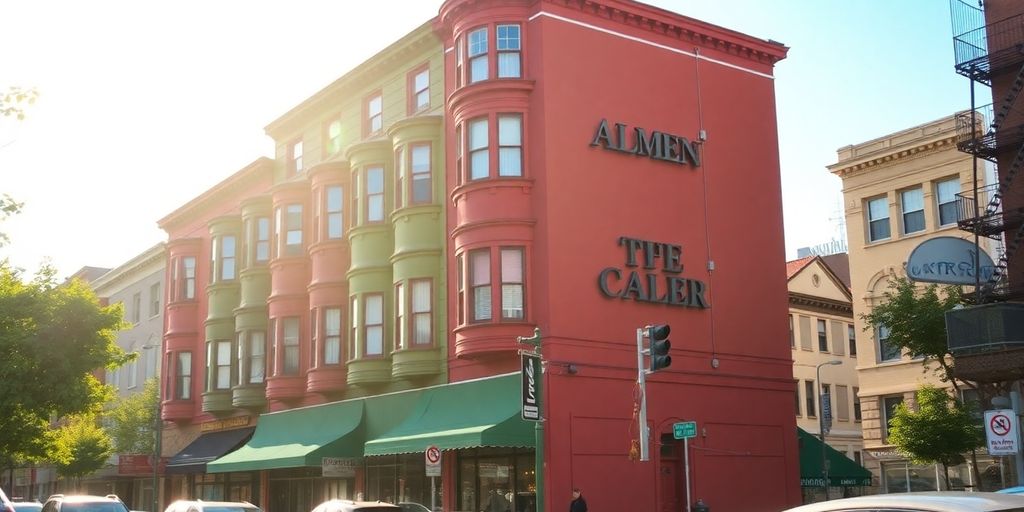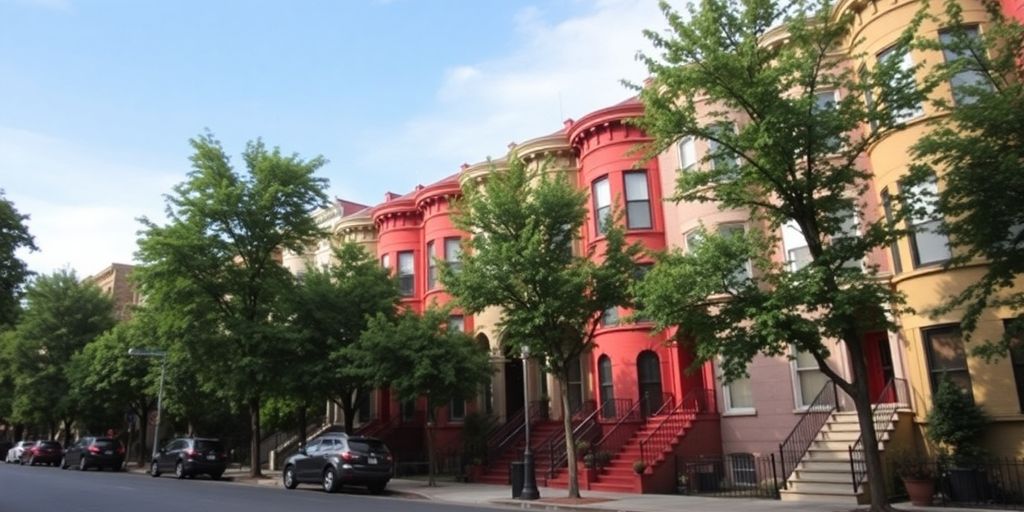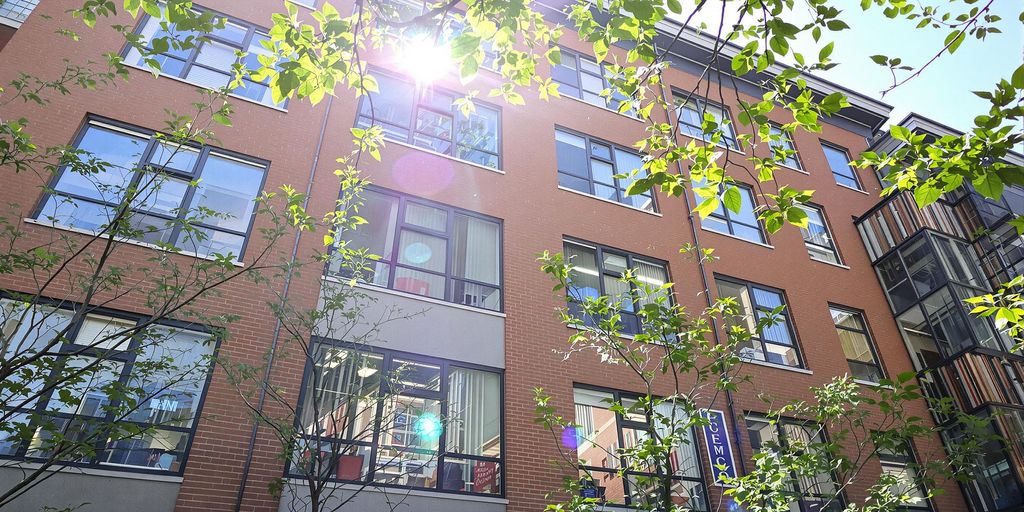Moving Into Adams Morgan DC? The Unspoken Truths Your New Building Won't Reveal
Rassul Yeshpayev
August 1, 2025
Rassul Yeshpayev
August 1, 2025
Moving into Adams Morgan DC? It's a neighborhood with a lot of character, that's for sure. You'll find colorful buildings, great food, and a lively atmosphere. But like any place, there's more going on beneath the surface than your lease agreement or building manager will ever tell you. This guide is about the unspoken truths of Adams Morgan, the things you might not find out until you're already living here.
Key Takeaways
- Adams Morgan is a hub of community activism, with residents actively involved in local debates about preservation and neighborhood changes.
- The neighborhood, like the wider DC area, is deeply connected to the District's statehood movement, a fight for representation and self-governance.
- The bar scene in Adams Morgan, and DC in general, often becomes a reflection of national political divides, creating unique challenges for staff and patrons.
- Home Rule gives DC residents local governance, but Congress still holds significant power to override local laws, impacting daily life.
- Demographic shifts and national political trends significantly shape the local political identity and community dynamics in Adams Morgan.
The Political Pulse of Your Adams Morgan Address
Moving to Adams Morgan means you're not just picking a place to live; you're also stepping into a neighborhood with a really active political scene. It’s not like anywhere else, honestly. You’ll find that politics isn't just something people talk about; it’s woven into the fabric of daily life here, influencing everything from local debates to the vibe at your favorite watering hole. It’s a city that’s constantly pushing for more say in its own affairs, and that energy is palpable.
Navigating Neighborhood Debates
Adams Morgan is known for its passionate residents who care deeply about their community. You'll see this play out in discussions about everything from preserving historic buildings against new development to the upkeep of public spaces like the Adams Morgan Plaza. These aren't just casual chats; they often involve organized efforts and community meetings where decisions are made that directly impact the neighborhood. It’s a place where people show up and make their voices heard.
The Unspoken Rule of DC Bars
DC bars, especially in a neighborhood like Adams Morgan, can be interesting places. While many spots aim for a relaxed atmosphere, the political undercurrent is always there. Some bars, like The Green Zone, have made politics part of their identity, which can lead to lively discussions. However, this also means that bar staff often have to manage differing viewpoints, and sometimes, conversations can get heated. There's an unspoken understanding that while debate is common, keeping things civil is key, though not always easy.
When Politics Spill into Daily Life
It’s not uncommon for political discussions to pop up unexpectedly, whether you're grabbing coffee or waiting for the bus. Because so many people in DC work in or are affected by politics, it’s a constant topic of conversation. This can be energizing for some, but it also means you might find yourself in a debate you didn't expect. The city's unique status as a federal district, with ongoing discussions about statehood, adds another layer to these everyday political conversations. It’s a reminder that local issues are often tied to bigger national ones.
Beyond the Colorful Facades: Adams Morgan's Deeper Currents

Adams Morgan is famous for its vibrant street art and lively atmosphere, but there's more going on beneath the surface than just colorful buildings and bustling nightlife. This neighborhood is a hub for community action, with residents actively involved in shaping its future. You'll find a strong sense of local pride and a dedication to preserving what makes Adams Morgan unique.
Community Activism and Preservation
People here really care about their neighborhood. There's a lot of energy put into keeping Adams Morgan's historic charm alive, fighting against new developments that might change the character of the area. Think of the efforts to protect local landmarks or the community gardens that pop up in unexpected places. It's a place where people get involved.
The Fight for Representation
Like much of Washington D.C., Adams Morgan is deeply connected to the broader movement for D.C. statehood. Residents understand that local governance is influenced by federal decisions, and many feel that the city's voice isn't heard enough in national politics. This desire for full representation is a constant undercurrent in neighborhood discussions.
Cultural Vibrancy and Its Roots
The neighborhood's cultural richness isn't just about the variety of restaurants and music venues, though those are certainly a big part of it. It's about the history of different communities settling here and contributing to the area's unique identity. This blend of cultures is what gives Adams Morgan its distinctive flavor, and it's something many residents are keen to celebrate and protect. It's a place where you can really see how different backgrounds come together, and it makes for a really interesting living experience. If you're looking for a place with a lot of character, this is definitely it. Many people find that living here offers a different perspective on city life, and it's a great way to experience the diversity of the capital. It's a good place to get your eyes checked too, with places like Brusco Vision nearby. local community spirit
Understanding Home Rule and Federal Influence

So, you've picked Adams Morgan, a neighborhood known for its vibrant streets and diverse community. But living here means you're also living under a unique system of governance. Washington D.C. operates under "Home Rule," which sounds pretty straightforward – residents get to pick their mayor and city council, right? Well, yes, but there's a big "but." Congress, way up on Capitol Hill, still holds a lot of sway. They can actually step in and change local laws, reject the city's budget, or even decide who gets appointed to our local courts. It's a constant balancing act, and sometimes it feels like our local decisions are always under a microscope. This federal oversight means that even though you're voting for local officials, the ultimate power doesn't always rest with the people of D.C.
Congress's Oversight of Local Laws
Think of it this way: D.C. is like a teenager who's been given some freedom, but their parents (Congress) can still ground them or tell them what to do. Congress has the authority to review and even nullify laws passed by the D.C. Council. This can be frustrating because it means that even if the majority of D.C. residents support a particular policy, Congress can simply say no. This has happened before, and it's a constant reminder of the city's unique status. For example, laws related to things like marijuana possession or how the city spends its own tax dollars have faced federal challenges. It’s a complicated relationship, and it directly impacts the laws you'll be living under day-to-day.
The Impact on Your Daily Governance
What does this mean for you, the new resident of Adams Morgan? It means that the services you receive, the taxes you pay, and the rules you follow are all subject to a layer of federal approval. Local initiatives that seem like common sense to residents might get stalled or blocked by federal lawmakers who may not fully understand or agree with the city's priorities. This can lead to a feeling of disconnect between what the community wants and what actually gets implemented. It's a system that can sometimes feel slow and unresponsive, especially when you're used to a more direct form of local control. You might find yourself paying attention to national politics in a way you never did before, just to understand how it might affect your neighborhood.
Potential Shifts in Self-Governance
Given this dynamic, there's always the possibility of shifts in how much self-governance D.C. actually has. Proposals to alter or even repeal Home Rule have surfaced periodically, especially during times of political change in Washington. This creates a sense of uncertainty about the future of local governance. While D.C. residents have consistently shown strong support for greater autonomy, the federal government's power means that these desires can be easily overridden. It’s a situation that many residents are actively working to change, advocating for D.C. statehood to gain full voting rights and control over their own affairs. Until then, understanding this federal influence is key to understanding how your city really works.
Adams Morgan: A Microcosm of DC's Statehood Movement
Adams Morgan, with its vibrant street art, diverse eateries, and lively music scene, often feels like a world unto itself. But beneath the surface, it's a neighborhood deeply connected to the larger political currents shaping Washington D.C. For many residents, the fight for D.C. statehood isn't just an abstract concept; it's a personal issue tied to representation and fairness. You'll find this passion reflected in local discussions and community organizing, making Adams Morgan a real snapshot of the city's broader push for equal footing.
The History of Disenfranchisement
For over 250 years, Washington D.C. has existed as a federal district, not a state. This means that despite having a population larger than many states, its residents lack full representation in Congress. They can't vote for senators and have only a non-voting delegate in the House of Representatives. It's a situation that many feel is fundamentally unfair, especially considering D.C. residents pay federal taxes just like everyone else. This long-standing lack of representation is a core part of the statehood argument.
Statehood as a Racial Justice Issue
It's important to understand that the push for D.C. statehood is also viewed as a racial justice issue. For a significant period, Washington D.C. was a majority-Black city, and even today, Black residents form the largest demographic group. The continued disenfranchisement of a city with such a large Black population is seen by many as a continuation of historical patterns of suppressing Black political power. The movement for statehood is therefore intertwined with the broader struggle for civil rights and equality.
The Broad Support for '51st State' Status
The desire for statehood is widespread among D.C. residents. In a 2016 referendum, a significant majority of voters, nearly 80 percent, cast their ballots in favor of making D.C. the 51st state. This level of support indicates that it's not a fringe movement but a mainstream political aspiration for the city. You'll hear this sentiment echoed in conversations around town, from local cafes to community meetings, reflecting a shared hope for full democratic participation. If you're thinking about moving to Adams Morgan, understanding this local political drive is key to understanding the neighborhood's spirit.
The ongoing debate about D.C. statehood highlights a unique aspect of living in the nation's capital: the constant interplay between local governance and federal authority. It's a dynamic that shapes everything from neighborhood development to the very rights of its residents.
The Bar Scene: Where Diplomacy Meets Partisanship
Adams Morgan, like much of DC, has a vibrant bar scene, but it's also a place where political leanings can really shape the atmosphere. You'll find places that lean progressive, and others that might attract a more mixed crowd, but the common thread is that politics often finds its way into conversations, whether the staff wants it to or not.
Hospitality Staff Managing Diverse Views
Bartenders and servers here are often caught in the middle. They're tasked with making sure everyone feels welcome, which gets tricky when patrons have strong, opposing political views. It’s a delicate balancing act. Many are trained to steer clear of political discussions altogether, but that's not always easy when the city itself is so politically charged. Some staff might even find themselves playing a role, agreeing with customers to keep the peace or ensure a good tip. It’s a tough gig, especially when national politics are heated.
Progressive Venues and Patron Reactions
Some spots in Adams Morgan, and DC more broadly, are known for their progressive stances. They might host events or have decor that reflects certain political viewpoints. This can attract like-minded patrons but also lead to friction with those who don't share those views. You might see patrons who are uncomfortable with the bar's ethos leave and then post reviews that don't directly mention politics but hint at dissatisfaction. It’s a way of expressing dissent without directly confronting the establishment.
The Challenge of Maintaining Neutrality
Keeping a bar neutral in a city like Washington can feel like an uphill battle. While some older, established places might have a strict 'no politics' rule, newer or more mission-driven venues might embrace political discussion. For example, a bar might rebrand a cocktail with a name that references a political figure or event. This can spark conversations, but it also risks alienating a portion of the customer base. The goal is often to create a space where people can relax, but in DC, that often means navigating a minefield of political opinions. It’s a constant effort to ensure that the focus stays on good drinks and good company, rather than divisive debates. You might find yourself wanting to discuss the latest news, but remember that many establishments prefer to keep the focus on community events and good times.
Demographic Shifts and Political Identity
Adams Morgan, like much of Washington D.C., is a neighborhood in constant flux. The people who call this vibrant area home are changing, and with that, the local political identity is shifting too. It’s not just about new faces; it’s about how these new residents, alongside long-time community members, are reshaping the conversations and priorities within the neighborhood.
The Evolving Political Landscape
Over the past decade, Adams Morgan has seen a significant influx of younger professionals and a diversification of its population. This demographic shift brings a fresh set of perspectives and political leanings. While the neighborhood has historically been known for its progressive leanings, the newer waves of residents are introducing different priorities, sometimes creating a dynamic tension with established community values. This evolution means that local elections and community meetings often reflect a broader spectrum of political thought than in years past. It’s a complex mix, and understanding these currents is key to grasping the neighborhood’s current political climate.
How Neighborhood Identity is Shaped
Neighborhood identity in Adams Morgan is a tapestry woven from many threads. It’s influenced by the area's rich cultural history, its famous nightlife, and the ongoing debates about development and preservation. As new residents move in, they bring their own ideas about what Adams Morgan should be. This can lead to discussions about everything from the types of businesses that thrive here to how public spaces are used. The very character of the neighborhood is constantly being negotiated. For instance, the push for more green spaces might clash with the need for new housing, creating lively community discussions that define the area's future.
The Influence of National Politics Locally
It’s impossible to ignore how national political trends seep into local life, especially in a city like Washington D.C. The broader political climate often amplifies local debates. Issues that might seem purely local can quickly become proxies for national political disagreements. This is particularly true in a city that, despite its population, lacks full representation. The ongoing discussions about D.C. statehood, for example, are a constant undercurrent in local politics, affecting how residents view their own governance and their place within the national political structure. This connection means that even seemingly small local issues can become entangled with larger political battles, impacting the day-to-day experience of living in Adams Morgan. You can find more about the unique political situation of D.C. at the Adams Morgan neighborhood.
As communities change, so do the ways people think about their place in the world. These shifts can influence how we vote and what we care about. Understanding these changes helps us see the bigger picture.
So, What's the Real Takeaway?
Look, Adams Morgan is a cool spot, no doubt about it. The energy, the food, the people – it’s got a lot going for it. But like any place, especially a city as unique as DC, there are layers you don't see on the surface. We've talked about how politics can spill into everyday life here, sometimes in ways that might surprise you. It’s not just about finding a place to live; it’s about understanding the pulse of the neighborhood and the city. So, as you settle in, keep your eyes open. Talk to people, get a feel for the vibe, and remember that the best way to truly know a place is to experience it, quirks and all. Welcome to the neighborhood, and good luck! Trusted by hundreds in Adams Morgan — BoxStar Movers is your go-to team. Book your move with 5-star pros today.
Frequently Asked Questions
What is Adams Morgan like?
Adams Morgan is a neighborhood in Washington, D.C. known for its colorful buildings, lively music scene, and diverse food options. It's a place with a lot of history and community spirit.
Why is D.C. statehood a big deal?
D.C. residents don't have full representation in the U.S. government. They can't vote for senators or have voting members in the House of Representatives. This is why many people want D.C. to become a state, so its citizens have the same rights as people in other states.
How does Congress affect D.C.?
Even though D.C. is part of the United States, Congress has the power to change or reject laws made by the local D.C. government. This means D.C. residents don't have complete control over their own city.
Is politics a big part of life in D.C.?
Yes, politics is a big part of life in D.C., especially in places like Adams Morgan. People often talk about politics in bars and community gatherings. It's a city where people's jobs can be tied to politics, making it a frequent topic of conversation.
How do bars handle politics?
Bars in D.C. often try to stay neutral on political issues to make sure everyone feels welcome. However, with strong political feelings in the city, it can be hard for bar staff to manage discussions and keep things calm.
How do different people in Adams Morgan affect the neighborhood?
Adams Morgan is a diverse neighborhood with people from many different backgrounds. This mix of people shapes the neighborhood's identity and how people feel about politics, both locally and nationally.












